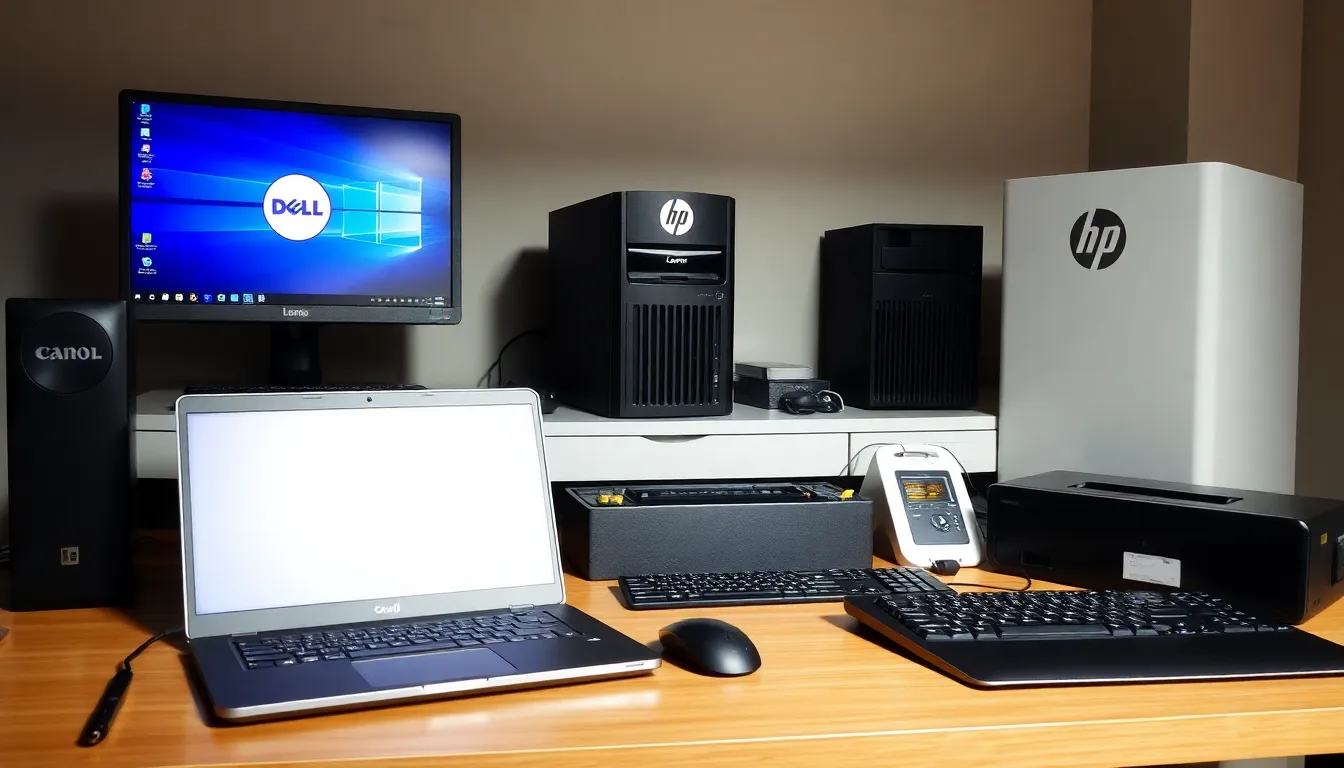Table of Contents
ToggleIn the ever-evolving world of technology, choosing the right hardware that seamlessly integrates with Linux can be a game changer. As more users embrace the flexibility and power of Linux, the demand for compatible devices continues to grow. From laptops to peripherals, having the right hardware ensures an optimized experience, enabling users to harness the full potential of their operating system.
Exploring Linux-compatible hardware opens up a realm of possibilities. Whether it’s for gaming, productivity, or creative projects, understanding compatibility can save time and frustration. This guide dives into the key components and devices that work harmoniously with Linux, empowering users to make informed decisions and elevate their computing experience.
Overview of Linux Compatible Hardware
Linux compatible hardware includes a variety of devices that seamlessly integrate with the Linux operating system. Selecting appropriate components enhances performance and ensures broad functionality across different Linux distributions.
Key Hardware Components
- Processors: Most Intel and AMD processors support Linux. They offer extensive compatibility with various distributions, making them ideal choices.
- Graphics Cards: NVIDIA and AMD graphics cards work efficiently with Linux, though users might need to install proprietary drivers for optimal performance.
- Motherboards: Motherboards from manufacturers like ASUS, Gigabyte, and MSI typically support Linux drivers. It’s essential to check for specific models that ensure compatibility.
- Storage Devices: Solid State Drives (SSDs) and Hard Disk Drives (HDDs) from brands such as Samsung and Western Digital generally work well with Linux systems. Verify support for file systems like ext4 and Btrfs.
- Networking Equipment: Wireless cards from Intel and Atheros are widely compatible. Ethernet adapters from TP-Link and Netgear also support Linux natively.
Peripherals
- Printers: Many printers from HP, Canon, and Epson offer Linux drivers, allowing for easy installation and management. Users can find additional support on the OpenPrinting website.
- Scanners: Scanners from Fujitsu and Epson usually include Linux compatibility. SANE (Scanner Access Now Easy) provides extensive support for various scanner models.
- Keyboards and Mice: USB and Bluetooth keyboards and mice from Logitech and Microsoft generally work out of the box on Linux, offering a hassle-free experience.
Laptops
Several laptops are built with Linux compatibility in mind. Brands like Dell, Lenovo, and System76 provide models pre-installed with Linux, ensuring drivers and support are readily available.
Conclusion
Selecting hardware that is Linux compatible guarantees functionality and enhances system performance. By focusing on specific components, users can create tailored setups for their needs, be it gaming or productivity.
Types of Linux Compatible Hardware

Understanding the types of hardware that work well with Linux helps users select devices that optimize system performance. The main categories include desktops and laptops, servers, and peripherals.
Desktops and Laptops
Desktops and laptops serve as primary machines for many Linux users. Popular brands like Dell, Lenovo, and System76 design models pre-installed with Linux or configured for optimal compatibility. Users benefit from options like the Dell XPS series and Lenovo ThinkPad models, known for their reliability and support. Additionally, desktops featuring AMD or Intel processors paired with NVIDIA or AMD graphics cards provide excellent performance. Motherboards from manufacturers such as ASUS, Gigabyte, and MSI are often optimized for Linux, ensuring stable operation and driver support.
Servers
Servers running Linux play a crucial role in enterprise environments and home labs. Models from HP, Dell, and Supermicro frequently support Linux distributions, offering robust performance for data processing and storage. Server hardware typically includes Intel Xeon or AMD EPYC processors, which deliver efficiency and scalability. Compatibility with storage solutions like RAID configurations enhances data integrity, while networking components such as Ethernet adapters from TP-Link and Netgear ensure seamless connectivity.
Peripherals
Peripherals enhance the Linux experience, with many options available. Printers from HP, Canon, and Epson generally offer drivers that support Linux, enabling users to print without compatibility issues. Scanners from Fujitsu and Epson also feature Linux-friendly drivers. Keyboards and mice from Logitech and Microsoft typically function without additional configuration. Additionally, USB headsets and webcams often operate seamlessly with various Linux distributions, allowing users to engage in video conferencing or remote work easily.
Choosing the Right Hardware
Choosing hardware compatible with Linux requires attention to specific aspects to ensure optimal performance and functionality. Key considerations include compatibility checks, performance factors, and user needs.
Considerations for Compatibility
Familiarity with hardware compatibility can prevent issues during installation and usage. Check the Linux Hardware Database for verified components and their drivers. Review forums and community discussions to gauge the compatibility of specific models. Manufacturers like Intel and AMD provide extensive compatibility lists for their processors, while peripheral manufacturers often indicate Linux support on product packaging. Opting for devices known for their Linux-friendly drivers streamlines the setup process and enhances user satisfaction.
Performance Factors
Assessing the performance capabilities of hardware is essential for achieving desired outcomes. Select processors with multiple cores, such as the Intel i5 or AMD Ryzen series, which enhance multitasking capabilities. Choose graphics cards based on intended use; NVIDIA cards typically require proprietary drivers for optimal performance, while open-source drivers support AMD cards effectively. Additionally, ensure adequate RAM; at least 8GB is recommended for smooth operation in most scenarios. Assess storage types, as SSDs generally provide faster load times and improved overall system responsiveness compared to traditional HDDs.
Popular Linux Compatible Brands
Many brands produce hardware that integrates effectively with Linux. The following are notable examples:
- Dell: Offers a range of laptops and desktops pre-installed with various Linux distributions, providing users with a reliable and supported experience.
- Lenovo: Features several models, including ThinkPad and ThinkCentre lines, designed for excellent Linux compatibility, often favored by professionals.
- System76: Specializes in laptops and desktops that come with Linux pre-installed, focusing on performance and user-friendliness.
- HP: Manufactures printers and other peripherals with built-in drivers for Linux, ensuring seamless functionality for users.
- ASUS: Produces motherboards known for their Linux support, making them popular choices for custom builds.
- Gigabyte: Like ASUS, offers motherboards and graphics cards appreciated for their compatibility with various Linux distributions.
- AMD: Supplies processors and graphics cards that work well on Linux, especially with open-source drivers available.
- NVIDIA: While graphics cards from NVIDIA offer robust performance, installing proprietary drivers is often necessary for optimal compatibility.
- Samsung: Known for SSDs that provide faster data access speeds, enhancing overall system performance on Linux.
- Western Digital: Supplies reliable HDDs and SSDs that are compatible with Linux systems, suitable for storage solutions.
- Logitech: Produces a variety of keyboards and mice that typically operate without additional setup on Linux systems.
- Microsoft: Offers certain keyboards and mice that function properly with Linux, enhancing productivity.
- Fujitsu and Epson: Both brands manufacture printers and scanners that support Linux drivers, allowing users to print and scan without hassle.
Focusing on these brands helps users identify reliable hardware options that ensure optimal compatibility and performance with Linux systems.
Choosing Linux compatible hardware is essential for a smooth and efficient computing experience. By prioritizing compatibility with trusted brands and components, users can maximize their system’s performance and reliability. Whether it’s for personal use or professional applications, the right hardware can make all the difference.
Staying informed about the latest developments in Linux-friendly devices ensures users are equipped to make the best choices. Engaging with community resources and databases helps in verifying compatibility and discovering new options. Ultimately, investing in the right hardware leads to a more enjoyable and productive Linux experience.






